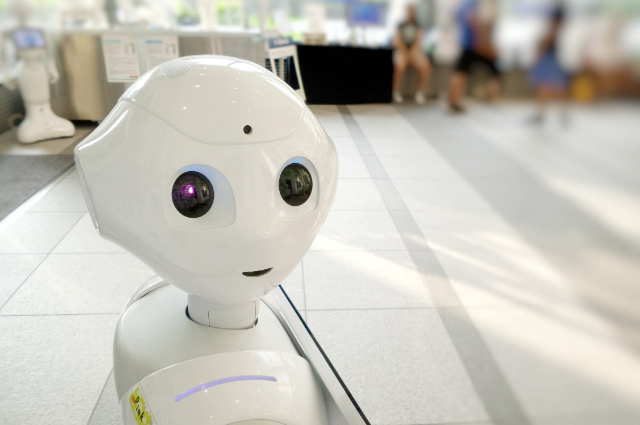
Photo by Possessed Photography on Unsplash
Introduction
Artificial intelligence (AI) has emerged as a transformative force, revolutionizing industries and reshaping our lives in unprecedented ways. The advent of AI technologies has brought forth a wave of innovation and possibilities, promising to enhance efficiency, productivity, and decision-making across various sectors. From self-driving cars that navigate our roads to virtual assistants that cater to our needs, AI has rapidly advanced, demonstrating its potential to improve our lives in numerous ways.
However, as AI becomes increasingly integrated into our society, it is crucial to navigate its promises and pitfalls through an ethical lens. While AI holds tremendous potential, it also raises complex ethical dilemmas that need to be carefully considered and addressed. As we enter an era where machines possess the ability to mimic human intelligence and make autonomous decisions, it becomes paramount to ensure that the development and deployment of AI align with ethical principles and values.
This article aims to explore the ethical frontier of artificial intelligence, delving into the profound ethical dilemmas that arise in its wake. By examining these challenges, we can gain a deeper understanding of the potential risks and consequences associated with AI deployment. Furthermore, we will explore potential solutions and strategies to navigate this ethical frontier responsibly, ensuring that AI technologies are developed and utilized in a manner that respects human values, fairness, transparency, and societal well-being.
In the following sections, we will discuss the promises of AI, examining how it has already revolutionized industries and improved various aspects of our lives. We will explore its potential to enhance efficiency, productivity, and decision-making, showcasing the positive impact AI has made across diverse domains. However, we must also acknowledge the ethical dilemmas that arise alongside these advancements.
As AI algorithms become more complex and influential, concerns related to bias, privacy, job displacement, and the potential for autonomous weapons demand our attention. We will delve into these ethical challenges, providing real-world examples and case studies that highlight the impact of AI on individuals and society as a whole. By understanding these challenges, we can begin to address them effectively.
Navigating the ethical frontier of AI requires a collaborative effort involving governments, organizations, researchers, and individuals. We will explore various approaches and solutions, including the establishment of regulatory frameworks, the development of transparent and explainable AI algorithms, and the importance of diversity and inclusivity in AI development teams. Furthermore, we will emphasize the role of individuals in advocating for ethical AI practices and engaging in public discourse to shape the trajectory of AI development.
Looking to the future, ongoing dialogue and collaboration will be essential to navigating the ethical frontiers of AI. As the field continues to evolve, emerging challenges and ethical considerations will demand our attention. By striking a balance between technological advancement and ethical considerations, we can create a future where AI benefits humanity while minimizing harm.
In the following sections of this article, we will delve into the promises and pitfalls of AI, exploring the ethical dilemmas it presents and offering guidance on responsible AI development. By critically examining these issues and providing actionable insights, we aim to contribute to the responsible integration of AI into society, ensuring that it aligns with our ethical values and promotes the welfare of all.

Photo by Owen Beard on Unsplash
Understanding Artificial Intelligence
Artificial intelligence (AI) refers to the development of computer systems capable of performing tasks that would typically require human intelligence. It encompasses both narrow AI, designed for specific tasks, and general AI, possessing human-level intelligence across a wide range of domains. Narrow AI is prevalent in applications such as image recognition, natural language processing, and recommendation systems, while general AI remains an area of ongoing research and development.
Narrow AI systems are designed to excel in specific areas, leveraging advanced algorithms and machine learning techniques to accomplish tasks with remarkable efficiency and accuracy. For example, image recognition algorithms can analyze and interpret visual data, allowing machines to identify objects, faces, or patterns in images. Natural language processing algorithms enable machines to understand and respond to human language, making virtual assistants like Siri and Alexa possible. Recommendation systems leverage AI to analyze user preferences and behavior, offering personalized suggestions for products, services, or content.
On the other hand, general AI aims to replicate human intelligence across a broad range of tasks and domains. While current AI systems are proficient in specific tasks, achieving human-level intelligence in various areas remains an ongoing challenge. General AI strives to develop machines that possess the cognitive abilities and adaptability to perform tasks at the same level as humans. Achieving general AI would require machines to reason, learn, understand, and apply knowledge across diverse domains, akin to human cognitive capabilities.
The Promises of Artificial Intelligence
AI holds tremendous promise, revolutionizing industries and improving various aspects of our lives. It has the potential to address complex challenges and enhance efficiency across domains. Here are some examples of the promises of AI:
- Unleashing the Potential in Healthcare:
AI-powered diagnostic systems have the potential to aid in early disease detection, leading to better patient outcomes. By analyzing medical images such as X-rays and MRIs, AI algorithms can assist radiologists in identifying abnormalities and detecting conditions like cancer at earlier stages. The ability to process vast amounts of medical data allows AI to uncover patterns and provide valuable insights for accurate diagnoses and personalized treatment plans.
- Transforming Finance:
In the field of finance, AI-powered systems can optimize investment strategies, improve risk management, and enhance market efficiency. AI algorithms analyze market data, historical trends, and economic indicators to identify investment opportunities and predict market movements. This enables financial institutions and investors to make informed decisions, mitigating risks and maximizing returns.
Advancing Transportation:
AI-driven advancements in transportation, such as autonomous vehicles, hold the promise of revolutionizing mobility. Self-driving cars have the potential to reduce accidents caused by human error, alleviate traffic congestion through optimized routing, and provide accessible transportation options for individuals who are unable to drive. Moreover, AI algorithms can be applied to optimize logistics, reducing costs and improving efficiency in areas such as package delivery and supply chain management.

Photo by Amanda Dalbjörn on Unsplash
Enhancing Efficiency and Decision-making:
AI technologies streamline processes and augment human decision-making across various domains. By automating routine and repetitive tasks, AI frees up valuable time for human professionals to focus on more complex and creative endeavors. AI algorithms can analyze vast amounts of data, identify patterns, and generate valuable insights, enabling more informed decision-making. For example, AI-powered chatbots can efficiently handle customer queries, improving customer service while reducing costs for businesses.
The promises of AI span across industries, offering opportunities for innovation, efficiency, and improved outcomes. However, it is crucial to approach the development and deployment of AI with a critical lens, considering the ethical implications and potential pitfalls that arise alongside these promises.
The Ethical Dilemmas of Artificial Intelligence
Ethical Frontiers Explored:
As AI continues to evolve, it raises critical ethical challenges that need to be addressed. One major concern is algorithmic bias, where AI systems can inadvertently perpetuate the biases present in the training data. This can lead to discriminatory outcomes in areas such as hiring, lending, and criminal justice. For example, if historical data used to train an AI system contains biased patterns, the system may unintentionally discriminate against certain demographic groups when making decisions.
Privacy is another pressing ethical issue in the realm of AI. As AI applications increasingly rely on personal data to function effectively, ensuring proper data protection and consent mechanisms is crucial. The misuse or mishandling of sensitive information can infringe upon individuals' privacy rights and lead to potential harm.
Job displacement is a significant concern associated with the adoption of AI technologies. As AI systems automate tasks traditionally performed by humans, there is a risk of widespread unemployment and socioeconomic inequalities. The loss of jobs can impact individuals and communities, requiring proactive measures to mitigate the potential negative consequences and ensure a just transition in the labor market.
The development of autonomous weapons raises moral questions about the use of AI in warfare. The deployment of AI-powered weapons systems with the ability to make lethal decisions independently raises concerns about the loss of human control, the potential for unintended consequences, and the ethical implications of delegating life-and-death decisions to machines.
Navigating the Ethical Frontier
Approaches and Solutions
Addressing the ethical dilemmas of AI requires a multidimensional approach involving various stakeholders. Governments play a crucial role in establishing regulatory frameworks to ensure responsible AI development. They can enact laws and policies that promote transparency, accountability, and fairness in AI systems. Additionally, governments can support research and development in AI ethics and provide guidelines for ethical AI design and deployment.
Transparent and explainable AI algorithms are essential to mitigate bias and improve accountability. Developers should strive to create algorithms that can be audited and understood by both experts and non-experts. This transparency enables the identification and mitigation of biases, allowing for fair and unbiased AI systems.
Organizations developing AI technologies must prioritize ethical considerations throughout the entire lifecycle of AI systems. This includes diverse and inclusive teams that can identify and address potential biases and unintended consequences. Ethical considerations should be integrated into the design, development, and deployment phases, ensuring that AI systems uphold ethical principles and societal values.
Auditing and certification processes can help ensure compliance with ethical standards. Independent audits and certifications can verify that AI systems meet specific ethical requirements and are not perpetuating biases or causing harm. These processes promote transparency, accountability, and public trust in AI technologies.
Furthermore, individuals have a responsibility to be informed about AI and actively participate in shaping its ethical trajectory. By educating themselves about AI technologies, understanding their implications, and engaging in public discourse, individuals can advocate for ethical AI practices and contribute to the responsible development and deployment of AI systems.
The Future of AI and Ethics
Shaping Tomorrow:
Looking ahead, ongoing dialogue and collaboration will be essential to navigating the ethical frontiers of AI. Interdisciplinary collaboration between computer scientists, ethicists, policymakers, and other stakeholders can foster a holistic approach to AI development. Continued research and development in AI ethics will help address emerging challenges and refine ethical frameworks, ensuring that ethical considerations keep pace with technological advancements.
Public awareness and engagement are crucial in shaping the ethical trajectory of AI. Open discussions, public forums, and inclusive decision-making processes can ensure that AI technologies align with societal values and serve the common good. By involving diverse perspectives and fostering transparency, society can collectively shape the development and deployment of AI technologies, creating a future where AI benefits humanity while minimizing harm.
Striking a balance between technological advancement and ethical considerations is vital. It requires a concerted effort from all stakeholders to foster a future where AI is developed and utilized in a manner that respects human values, promotes fairness, transparency, and upholds the well-being of individuals and society as a whole.
Conclusion
Artificial intelligence has emerged as a powerful force with the potential to revolutionize industries and improve various aspects of our lives. However, as we witness the rapid advancements of AI, it is crucial to navigate its promises and pitfalls through an ethical lens. The ethical frontiers of AI present complex challenges that demand our attention and proactive action.
In this article, we explored the promises of AI, showcasing its potential to enhance efficiency, productivity, and decision-making across different domains. AI-powered systems have already made significant strides in healthcare, finance, transportation, and more, demonstrating their ability to improve outcomes and transform industries. However, alongside these promises, we also delved into the ethical dilemmas that arise with the proliferation of AI technologies.
Algorithmic bias, privacy concerns, job displacement, and the development of autonomous weapons represent just a few of the ethical challenges associated with AI. Algorithmic bias can perpetuate discrimination and inequality, while privacy issues demand robust data protection mechanisms. Job displacement raises questions about socioeconomic impacts, and the use of AI in warfare presents moral dilemmas regarding human control and the consequences of autonomous decision-making.
To navigate the ethical frontiers of AI, a multidimensional approach is necessary. Governments play a critical role in establishing regulatory frameworks that promote responsible AI development, ensuring transparency, accountability, and fairness. Organizations must prioritize ethical considerations throughout the entire lifecycle of AI systems, fostering diverse and inclusive teams that can identify and address biases and unintended consequences. Transparent and explainable AI algorithms are essential to mitigate bias and improve accountability.
Individuals have a responsibility to stay informed about AI and actively engage in shaping its ethical trajectory. By advocating for ethical AI practices, participating in public discourse, and demanding transparency, individuals can contribute to the responsible development and deployment of AI technologies.
Looking to the future, ongoing dialogue, collaboration, and research are essential to navigate the ethical frontiers of AI. Interdisciplinary collaboration between experts in computer science, ethics, policy, and other fields can foster a holistic approach to AI development that considers ethical implications. Continued research and development in AI ethics will help address emerging challenges and refine ethical frameworks. Public awareness and engagement are crucial to ensuring that AI technologies align with societal values and serve the common good.
In conclusion, the responsible integration of AI into our society requires us to navigate its ethical frontiers diligently. By embracing transparency, accountability, and diversity, we can harness the immense potential of AI while upholding ethical principles and safeguarding the well-being of individuals and society as a whole. Through collaborative efforts, we can build a future where AI is harnessed for the benefit of all, fostering a society that thrives on the ethical and responsible use of artificial intelligence.
